Crescent Sustainability Initiatives
Partnerships for the Goals (SDG 17)
ENGAGING IN CROSS-SECTORAL DIALOGUE FOR SUSTAINABLE DEVELOPMENT
The B.S. Abdur Rahman Crescent Institute of Science and Technology is actively engaged in fostering cross-sectoral dialogue about the Sustainable Development Goals (SDGs) through various initiatives and conferences. One notable event was the 6th International Conference on Management, Accounting, Banking, Economics, and Business Research for Sustainable Development, held on March 1st and 2nd, 2023. This conference served as a vital platform for bringing together academia, industry professionals, and policymakers to discuss pressing issues related to sustainable development. By facilitating dialogue among diverse stakeholders, the conference aimed to strengthen relationships that can lead to impactful SDG policy development.
INTEGRATING SUSTAINABILITY INTO BUSINESS PRACTICES
During the conference, participants engaged in discussions that highlighted the importance of integrating sustainable development principles into business practices. Notable speakers emphasized how entrepreneurship can drive social and environmental sustainability, showcasing the potential for academic and professional communities to contribute valuable insights to SDG policy formulation. The exploration of key themes, such as the intersection of accounting and sustainable development, underscored the necessity of incorporating diverse perspectives in policy discussions, thereby enriching the dialogue surrounding the SDGs.
Strengthening Partnerships for Effective SDG Policy Development
In addition to the conference, the institute is committed to enhancing relationships with regional NGOs and government bodies for SDG policy development. By participating in the Sustainable Development Goal Conference, the institute identifies challenges related to sustainability and formulates effective policies and strategies. This involvement not only facilitates adaptive management but also ensures that policies remain responsive to evolving needs and conditions. The institute’s role in monitoring and reporting on the outcomes of interventions further contributes to the collaborative framework necessary for achieving the SDGs.
2. Cultivating a Culture of Sustainability through Collaborative Efforts
Moreover, the institute’s commitment to cross-sectoral dialogue is exemplified through its partnerships with various organizations, including the Council of Architecture and the State Level Solid Waste Management Committee. These collaborations enable faculty members, such as Prof.Jayalakshmi, to contribute directly to policy development and implementation efforts that align with the SDGs. By actively engaging in these dialogues, the institute fosters a culture of sustainability and encourages the sharing of knowledge and resources among stakeholders.
3. Towards a Comprehensive Approach to Sustainable Development
Overall, the B.S. Abdur Rahman Crescent Institute of Science and Technology’s initiatives in cross-sectoral dialogue about the SDGs reflect a comprehensive approach to sustainable development. By bringing together diverse stakeholders, the institute not only enhances its own understanding of sustainability challenges but also contributes to the broader efforts of national and regional governments and NGOs in advancing the SDGs. This collaborative framework is essential for developing effective policies that promote a sustainable future for all.
ENHANCING RELATIONSHIPS WITH NGOS AND GOVERNMENT FOR SDG POLICY DEVELOPMENT
B.S. Abdur Rahman Crescent Institute of Science and Technology is actively developing Sustainable Development Goal (SDG) policies through participating in the Sustainable Development Goal Conference. This involvement encompasses a range of critical activities, including identifying problems and challenges related to sustainability, formulating effective policies and strategies, and modelling potential future scenarios with and without specific interventions. Furthermore, the institute plays a key role in monitoring and reporting on the outcomes of these interventions, which facilitates adaptive management and ensures that policies remain responsive to evolving needs and conditions. B.S. Abdur Rahman Crescent Institute contributes significantly to advancing sustainable practices and fostering collaboration among national governments and regional non-governmental organisations through these efforts.
6TH INTERNATIONAL CONFERENCE ON MANAGEMENT, ACCOUNTING, BANKING, ECONOMICS AND BUSINESS RESEARCH FOR SUSTAINABLE DEVELOPMENT – 1st and 2nd March, 2023
The 6th International Conference on Management, Accounting, Banking, Economics, and Business Research for Sustainable Development, held on March 1st and 2nd, 2023, served as a vital platform for fostering relationships among academia, industry, and policymakers. Organized by the Department of Commerce, this conference brought together a diverse group of participants, including academicians, professionals, industry experts, research scholars, and students, to share knowledge and discuss pressing issues related to commerce and management. The conference aimed to strengthen connections that can lead to impactful SDG policy development by facilitating dialogue among various stakeholders.
ENGAGING ACADEMIC AND PROFESSIONAL COMMUNITIES
The conference featured numerous presentations and discussions focused on sustainable practices and the role of entrepreneurship in achieving the SDGs. Notable speakers, such as Prof.Dr. MBM Ismail from the South Eastern University of Sri Lanka, emphasised the importance of integrating sustainable development principles into business processes. The conference highlighted the potential for academic and professional communities to contribute valuable insights to SDG policy formulation by discussing how entrepreneurship can drive social and environmental sustainability.
ADDRESSING KEY THEMES IN SUSTAINABLE DEVELOPMENT
The conference explored various themes, including the intersection of accounting and sustainable development, as Dr.Nasar from the South Eastern University of Sri Lanka presented. His insights into how accounting practices can support sustainable business models underscored the necessity of incorporating diverse perspectives in policy discussions. Additionally, the emphasis on financial inclusion and women’s empowerment, as addressed by Dr Chandramohan and Dr RazanaJuhaida Johari, reinforced the need for inclusive policies that consider the unique challenges different demographic groups face in achieving sustainability.
BUILDING A COLLABORATIVE FRAMEWORK FOR FUTURE INITIATIVES
The successful execution of the conference not only fostered a collaborative environment but also laid the groundwork for ongoing relationships between academia, government, and NGOs. By engaging in meaningful discussions and sharing research findings, participants contributed to a collective understanding of the challenges and opportunities related to the SDGs. Moving forward, these stakeholders must maintain open lines of communication and collaboration, ensuring that a comprehensive understanding of the issues at hand informs their efforts in SDG policy development. This collaborative framework will ultimately enhance the effectiveness of policies that foster a low-carbon economy and achieve sustainable development.
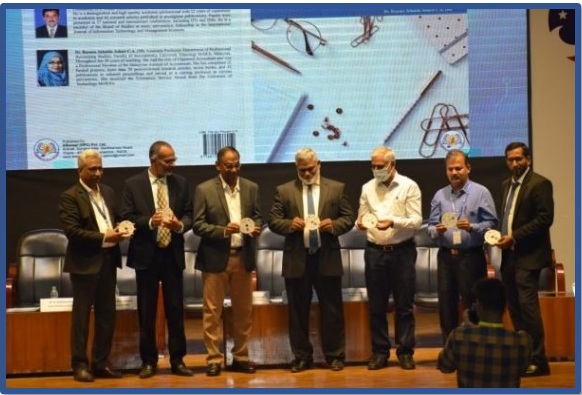
Figure XVII (2.2) – 1: Inauguration of the conference
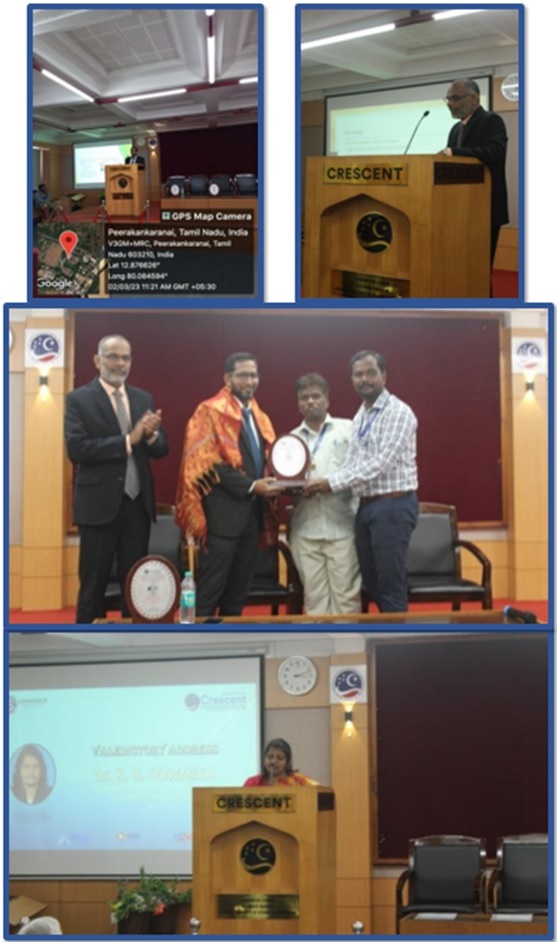
Figure XVII (2.2) – 2: Plenary sessions
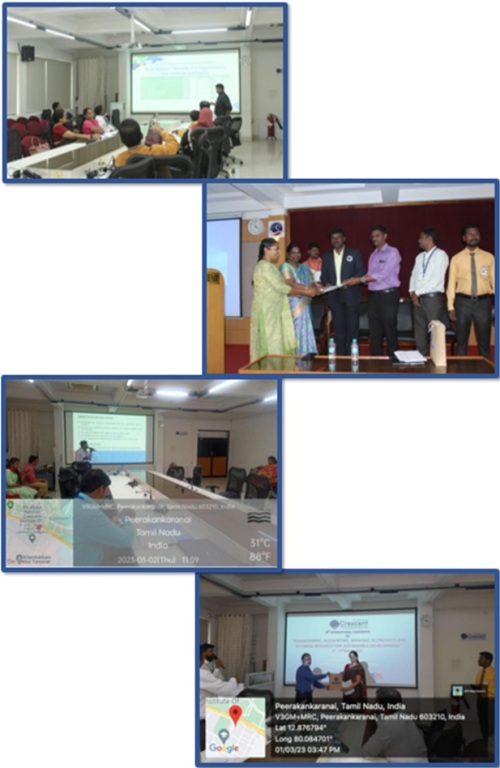
Figure XVII (2.2) – 3: Track presentation and certificate distribution
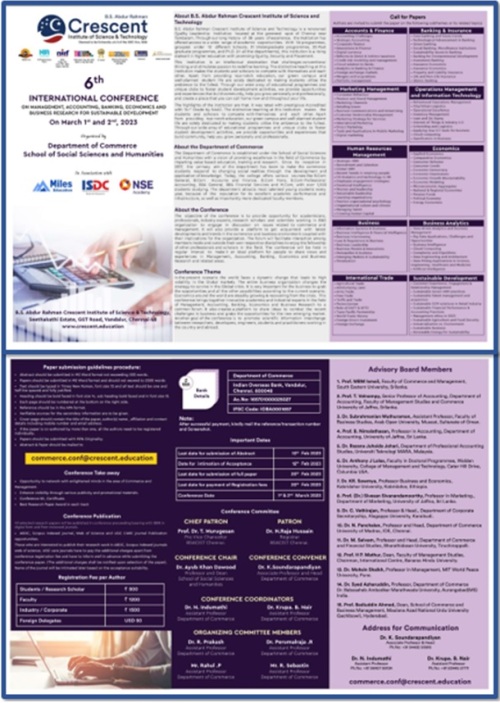
Figure XVII (2.2) – 4: Brochure of the conference
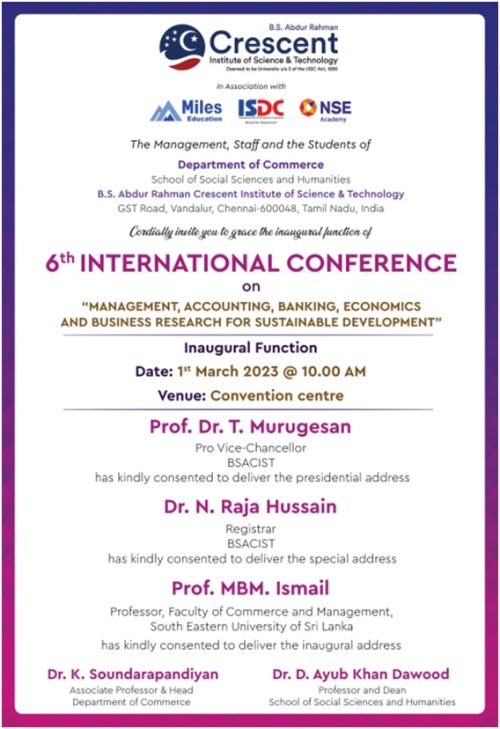
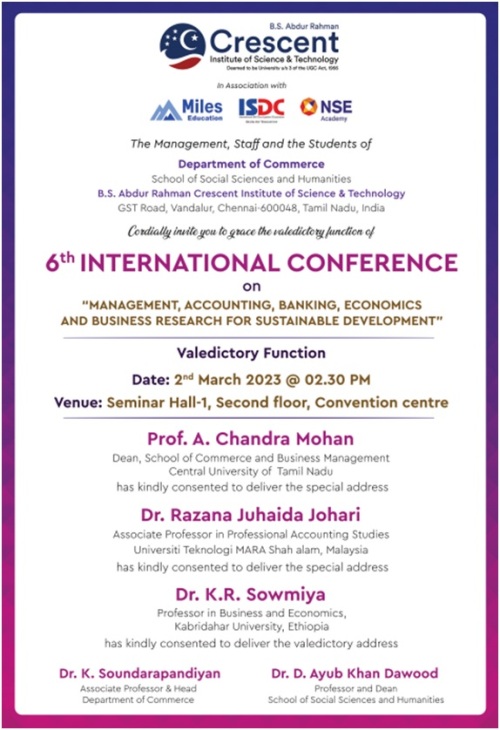
Figure XVII (2.2) – 5: Invitation for the inaugural and valedictory function
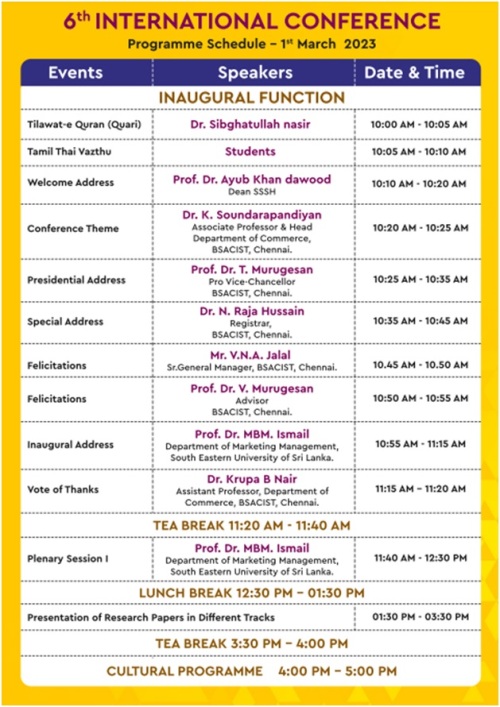
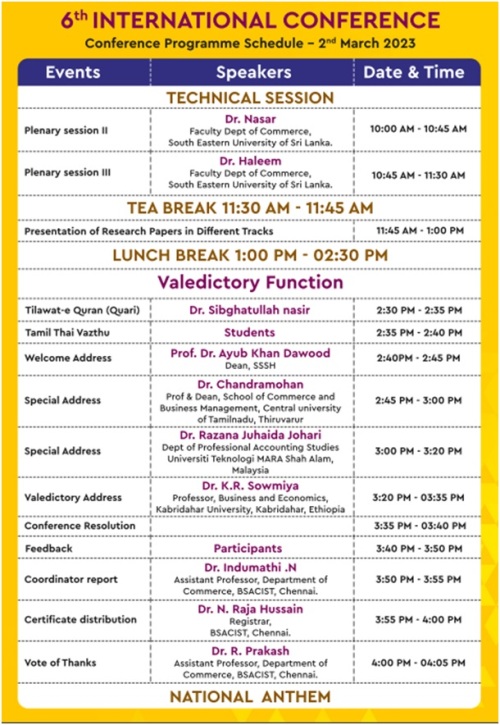
Figure XVII (2.2) – 6: International Conference Programme Schedule
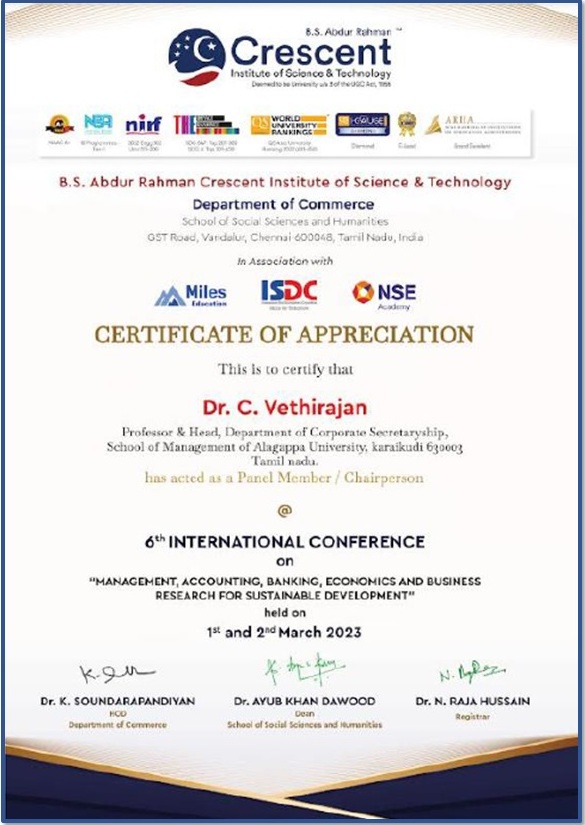
Figure XVII (2.2) – 7: Certificate of the Conference

NATIONAL CONFERENCE ON FUNCTIONAL MATERIALS FOR SUSTAINABLE ENERGY & INFORMATION TECHNOLOGY (FUMSEIT – 2023)
EVENT OVERVIEW
The B.S. Abdur Rahman Crescent Institute of Science and Technology is hosting the National Conference on Functional Materials for Sustainable Energy & Information Technology (FuMSEIT – 2023) on November 27th and 28th, 2023. This conference aims to unite experts, researchers, and practitioners to discuss advancements in functional materials that contribute to sustainable energy solutions and information technology.
COLLABORATION AND POLICY DEVELOPMENT
In alignment with the Sustainable Development Goals (SDGs), particularly SDG 7: Affordable and Clean Energy, this conference will facilitate direct involvement in policy development related to clean energy. Participants will engage in identifying challenges, developing strategies, and modeling potential futures with and without specific interventions. The event will also focus on monitoring and reporting on interventions, enabling adaptive management in the context of sustainable energy practices.
KEY DETAILS
- Organizer: B.S. Abdur Rahman Crescent Institute of Science and Technology, in collaboration with the Federation of Economic Development Association (F.E.D.A.), Tamil Nadu Chapter.
- Location: B.S. Abdur Rahman Crescent Institute of Science and Technology, Chennai.
- Dates: November 27-28, 2023.
CALL FOR PAPERS
Original research articles are invited on a wide range of topics, including but not limited to:
- Advancements in Nanoscience and Nanomaterials
- Energy Storage Technologies
- Eco-friendly Materials
- Artificial Intelligence and Data Science
- Photovoltaics and Power Systems
PARTICIPATED MEMBERS
The conference welcomes:
- Faculty researchers
- Research Scholars
- UG/PG students from reputed institutions
- Industry professionals
- Scientists from R&D labs
PUBLICATION OPPORTUNITIES
Selected abstracts will be published in conference proceedings with an ISBN. Full-length papers may also be considered for publication in Scopus/WOS-indexed journals. Awards will be given for the best oral and poster presentations.
NETWORKING AND COLLABORATION
This conference provides a unique opportunity for networking, knowledge exchange, and collaboration among attendees, fostering innovations that align with national and global sustainability goals.
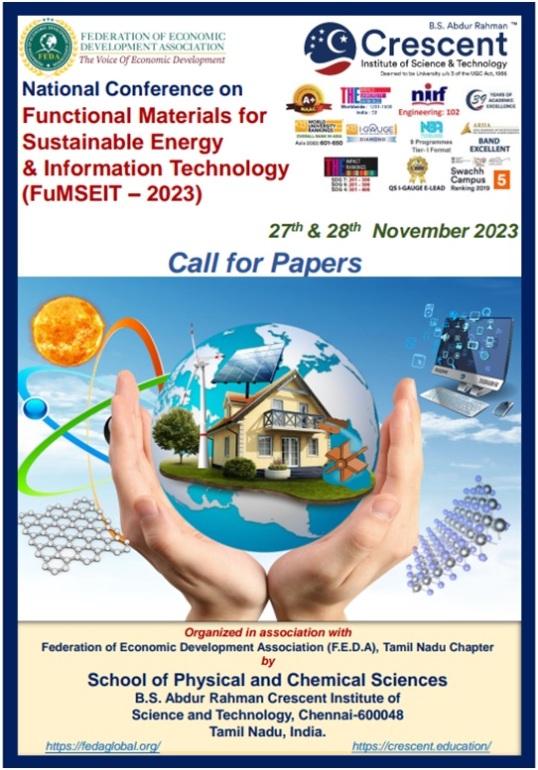
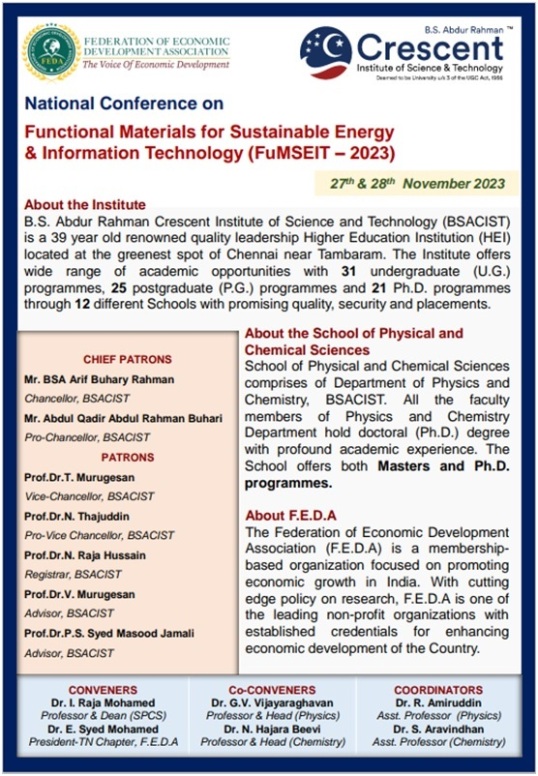
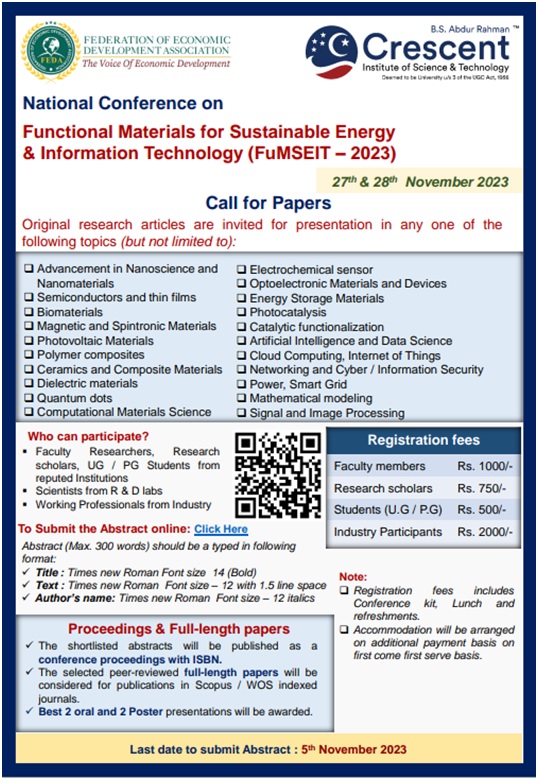
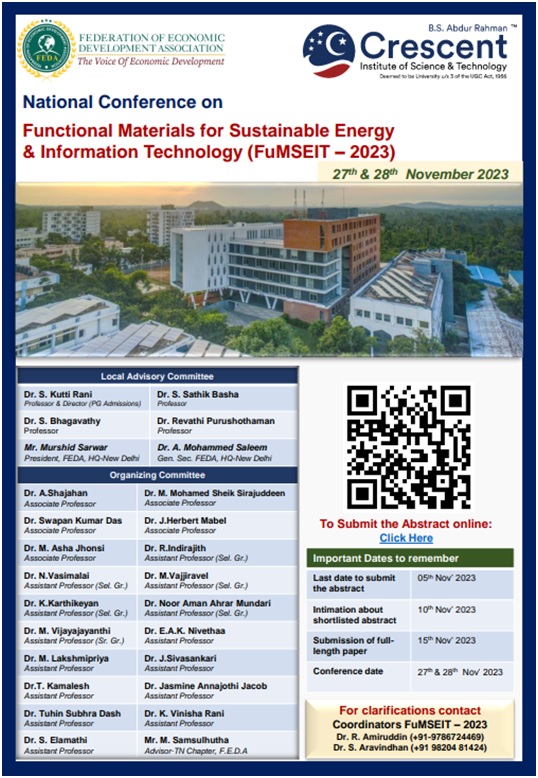
Figure XVII (2.2) – 8: Brochure of the Conference
Table XVII (2.2) – 1 : Partnerships and Collaborations of B.S. Abdur Rahman Crescent Institute of Science and Technology Aligned with Sustainable Development Goals
FOSTERING INTERNATIONAL COLLABORATION FOR SUSTAINABLE DEVELOPMENT GOALS
On May 17, 2023, from 2:30 PM to 4:10 PM, Dr.Ayub Khan Dawood, Dean of the School of Social Sciences and Humanities, in conjunction with the Centre for International Relations (CIR), organized a significant meeting with Mr. Hiroaki Yumoto, Chairman of the International SDGs Human Resource Support Association (ISHA) from Osaka. The meeting took place in Seminar Hall III of the Convention Centre and was chaired by our esteemed Advisor, Dr. V. Murugesan.
During this engaging session, Mr. Yumoto, along with Mr. Karunanidhi from the KCCS Indo-Japan Bridge Organization, explored potential collaborative opportunities with Japanese institutions and industries. Key areas of discussion included fostering student and faculty exchange programs, aligning with our commitment to partnership for the Sustainable Development Goals (SDGs). This cooperation aims to enhance cross-cultural learning experiences, promote knowledge sharing, and contribute to building a sustainable future through education and international collaboration.
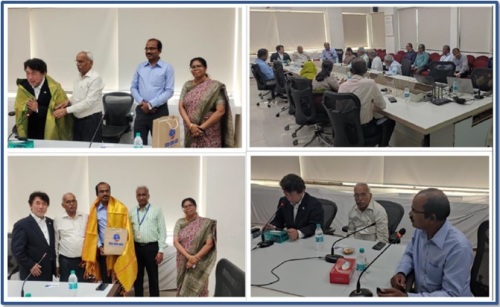
Figure XVII (2.2) – 9: Mr. Yumoto and Mr. Karunanidhi from KCCS Indo Japan bridge organization
INTERNATIONAL COLLABORATION ACTIVITIES TOWARDS SDGS IN DUBAI
Dr. P. Rathna, Director of the Centre for International Relations (CIR), visited Dubai from April 24 to 30, 2023, to promote international relations activities. On April 25, she met with Mr. Nabeel, an officer at the Knowledge and Human Development Authority (KHDA), to successfully submit details regarding the BSACIST Education Support Services through their online portal.
During her visit, Dr.Rathna also engaged in valuable discussions with delegates from various international universities, exploring potential collaborations that align with our commitment to advancing the Sustainable Development Goals (SDGs). These discussions focused on fostering partnerships that enhance educational opportunities and promote cross-border knowledge exchange, further strengthening our dedication to global educational initiatives.
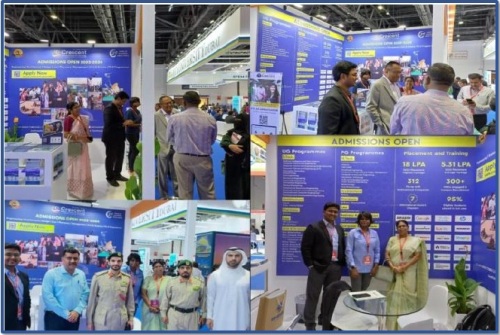
Figure XVII (2.2) – 10: Dr.Rathna engaged in valuable discussions with delegates from various international universities
ENHANCING SUSTAINABLE DEVELOPMENT THROUGH INTERNATIONAL INTERNSHIPS
On March 2, 2023, the Centre for International Relations (CIR) hosted a meeting focused on International Internships related to Sustainability Projects. During the session, Mr. Abdul Qadhir Bukhari from Green Global and Mr. HajaMohideen from Denvik Technology engaged with interested students to discuss opportunities for hands-on experience in sustainability.
This meeting aligns with our commitment to sustainable development by fostering direct involvement in policy development related to the Sustainable Development Goals (SDGs). Discussions included identifying challenges in sustainability initiatives, exploring effective strategies, and modeling potential outcomes based on varying intervention approaches. By providing students with these internship opportunities, CIR aims to enhance their understanding of adaptive management practices and contribute to national and regional efforts in advancing SDG objectives.
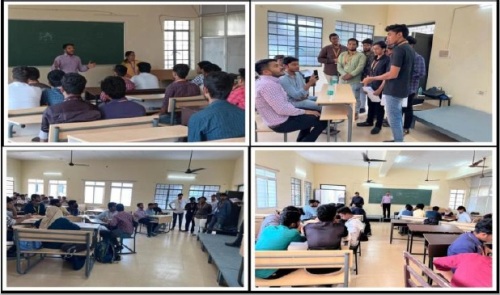
Figure XVII (2.2) – 11: Mr. Abdul Qadhir Bukhari from Green Global and Mr. HajaMohideen from Denvik Technology engaged with interested students to discuss opportunities for hands-on experience in sustainability
EMPOWERING FUTURE LEADERS THROUGH INTERNATIONAL INTERNSHIPS IN SUSTAINABILITY
Final year Electrical and Electronics Engineering (EEE) students, Mohamed Sabiq, Ganesh Kumar, and Vinit Kumar, have been shortlisted for international internships with Denvik Technology in the UAE, focusing on sustainability projects.
This opportunity aligns with our commitment to engaging students in activities that contribute to Sustainable Development Goals (SDGs). Through these internships, students will actively participate in identifying challenges and strategies related to sustainability. Their involvement will also encompass modeling potential outcomes of various interventions, contributing to monitoring and reporting efforts, and fostering adaptive management approaches in sustainability initiatives. This experience will equip them with the skills and insights necessary to influence SDG policy development at both national and regional levels.

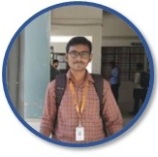

Figure XVII (2.2) – 12: Final year Electrical and Electronics Engineering (EEE) students, Mohamed Sabiq, Ganesh Kumar, and Vinit Kumar, have been shortlisted for international internships
ENGAGING IN SUSTAINABLE DEVELOPMENT GOALS POLICY DEVELOPMENT
The commitment to sustainable development is reflected in various collaborative activities undertaken by our institution, particularly through the involvement of faculty members in significant initiatives. For instance, Prof.Jayalakshmi, Dean of the Crescent School of Architecture, has been appointed as an Industry Expert Member of the State Level Solid Waste Management Committee by the Tamil Nadu State Government. This role allows her to contribute directly to the development of policies and strategies aimed at tackling solid waste management challenges in the region. By actively participating in such committees, faculty members can identify pressing issues, propose effective solutions, and monitor the implementation of interventions that align with the Sustainable Development Goals (SDGs).
INTEGRATING SUSTAINABILITY INTO THE ACADEMIC CURRICULUM
In addition to individual contributions, the integration of sustainability into the academic curriculum plays a pivotal role in fostering a culture of awareness and action among students. The B.Arch and B.Des programs include dedicated sustainability courses such as Climatology and Energy Efficient Architecture, ensuring that students are equipped with the knowledge and skills necessary to tackle contemporary environmental challenges. Furthermore, the curriculum is designed to incorporate SDGs into the Programme Educational Objectives (PEOs), reinforcing the importance of sustainable practices in architectural education. This holistic approach not only prepares students for future challenges but also empowers them to take proactive roles as future leaders in the field.
FOSTERING KNOWLEDGE EXCHANGE AND COLLABORATION
Moreover, the institution actively facilitates platforms for knowledge exchange and collaboration through events such as international conferences and expert-led workshops. The recent International Conference on Architecture, conducted in a hybrid format, brought together architects and experts from around the globe, fostering discussions on sustainable practices in architecture. Additionally, regular engagement with industry experts during curriculum reviews ensures that academic programs remain relevant and responsive to emerging trends. These initiatives collectively contribute to the adaptive management of sustainability practices, empowering the institution to model likely futures with and without interventions while continuously enhancing its approach to achieving the SDGs.
Table XVII (2.2) – 2: Involvement of B.S. Abdur Rahman Crescent Institute of Science and Technology in Sustainable Development Goal-related Activities
| S. No | Details of collaboration | Organisation | Relevant SDGs |
| 01 | Visit to Old-age home as part of Social outreach club | Kai Koduppom, Arakattalai | SDG 3 (Good Health and Well-Being) |
| 02. | Visit to Ashram as part of Social outreach club | TGS Ashram | SDG 3 (Good Health and Well-Being) |
| 03. | Prof Jayalakshmi, Dean of Crescent School of Architecture has been identified as one of the Industry Expert Members of the State Level Solid Waste Management committee that has been Constituted by the Public Works Department (State PWD) as per the directives of the Honourable Chief Minister of Tamil Nadu State Government, Mr.MK Stalin. | Solid Waste Management Committee, Tamil Nadu State Government | SDG 6 (Clean Water and Sanitation) |
| 04. | Prof Jayalakshmi, Dean of Crescent School of Architecture was appointed as regional Coordinator for conduct of National Aptitude Test for Architecture (NATA) | Council of Architecture | SDG 4 (Quality Education) |
| 05. | Prof. Ar. Jayalakshmi, Dean, Crescent School of Architecture, had presented the technical session on “Virtual Reality in Architecture” in the International Guest lecture series conducted by Atmajaya University, Indonesia. | Atmajaya University, Indonesia | SDG 4 (Quality Education), SDG 9 (Industry, Innovation, and Infrastructure) |
| 06. | Prof. Ar. Jayalakshmi, Dean, Crescent School of Architecture was elected as Council of Architecture Member under the Heads of Institutes category for the past three years. | Council of Architecture | SDG 4 (Quality Education) |
| 07. | Prof. Ar. Jayalakshmi, Dean of Crescent School of Architecture was one of the Expert members at the Faculty Development Programme, “Celebrating Women in Architecture” organised by Nehru School of Architecture. | Nehru School of Architecture | SDG 4 (Quality Education), SDG 5 (Gender Equality) |
Table XVII (2.2) – 3: : Involvement of B.S. Abdur Rahman Crescent Institute of Science and Technology in Sustainable Development Goal-related Educational Initiatives
S,NO | Parameter | Details | Relevant SDGs |
01 | Dedicated sustainability courses | Climatology, Energy efficient Architecture, Sustainable Architecture are few of the courses to name amongst the sustainability-oriented courses in the Curriculum structure of B.Arch & B.Des | SDG 4 (Quality Education), SDG 7 (Affordable and Clean Energy) |
02. | Integration of SDGs across the curriculum | Programme educational objectives (PEOs) in the B.Arch & B.Des syllabus regulation 2021 has been integrated with SDGs as per the Institute directives. | SDG 4 (Quality Education), SDG 17 (Partnerships for the Goals) |
03. | Elective courses on sustainability | Energy Efficient Architecture is one of sustainability-oriented elective courses | SDG 4 (Quality Education), SDG 7 (Affordable and Clean Energy) |
04. | Full degree programmes related to SDGs | Programmes B.Arch, B.Des and M.Arch are integrated with SDGs | SDG 4 (Quality Education), SDG 17 (Partnerships for the Goals) |
Table XVII (2.2) – 4: : Involvement of B.S. Abdur Rahman Crescent Institute of Science and Technology in Sustainable Development Goal-related Community Engagement
S.No. | Event | Details | Relevant SDGs |
01. | International conference on Architecture organised by Crescent School of Architecture | Conducted in hybrid mode with many international and national architects and experts attending the conference. | SDG 4 (Quality Education), SDG 17 (Partnerships for the Goals) |
02. | Conduct of Intermediate External reviews | Architects from various reputed organisations take part and engage in reviews with the students to make them understand the current trends of the industry. | SDG 4 (Quality Education), SDG 9 (Industry, Innovation, and Infrastructure) |
03. | Conduct of regular Parent Teacher’s meeting | PTM is being organised semester-wise wherein the students, parents, and faculty come together for planning the improvement of the students. | SDG 4 (Quality Education), SDG 17 (Partnerships for the Goals) |
04. | Involving Expert members in Board of Studies | Expert members who are academicians and renowned architects are brought in for their valuable inputs during the curriculum development. | SDG 4 (Quality Education), SDG 17 (Partnerships for the Goals) |
ANNUAL SDG ACCORD REPORT 2024 PUBLISHED
EAUC has published the 7th annual SDG Accord progress report, highlighting the collective progress towards the SDGs in the college and university sector.
1. The SDG Accord is a worldwide initiative bringing together over 2800 organisations and individuals dedicated to promoting the United Nations Sustainable Development Goals (SDGs) in universities and colleges. It is endorsed by the United Nations Sustainable Development Solutions Network and United Nations Environment Programme.
This year’s report is the biggest yet, analysing data from 184 institutions across 40 countries to identify trends in progressing the goals across the sector. It also comes in a crucial year as global leaders meet to assess the progress and future of these goals, and has been launched this year to coincide with Global Goals Week.
It includes case studies which highlight real-world examples from signatories, highlighting different ways colleges and universities are integrating the SDGs into their work and overcoming obstacles.
2. The Dual Purpose of the SDG Accord in Promoting Cross-Sectoral Dialogue
The SDG Accord serves a dual purpose in fostering cross-sectoral dialogue about the Sustainable Development Goals (SDGs). First, it aims to inspire, celebrate, and advance the critical role of education in achieving the UN SDGs, highlighting the significant value these interlinked objectives bring to governments, businesses, and society at large. By showcasing successful initiatives and practices in education, the Accord encourages collaboration among various stakeholders, including government agencies, non-governmental organizations (NGOs), and educational institutions.
3. Commitment to Action: Strengthening Efforts Towards the SDGs
Second, the Accord represents a collective commitment by educational institutions to enhance their efforts in delivering the SDGs. Signatory institutions pledge to take actionable steps and regularly report on their progress, fostering a culture of transparency and accountability. This commitment includes sharing insights and best practices with one another both nationally and internationally, thereby enriching the cross-sectoral dialogue surrounding the SDGs.
4. Engaging in Global Dialogue: Objectives of the SDG Accord
Key objectives of the SDG Accord involve the annual presentation of updated metrics and progress reports at the UN High Level Political Forum on Sustainable Development. By participating in these high-profile conferences, institutions can engage with policymakers and stakeholders, effectively contributing to discussions on sustainability and educational reform. This collaborative approach not only strengthens partnerships across sectors but also helps shape effective policies aimed at advancing the SDGs globally.
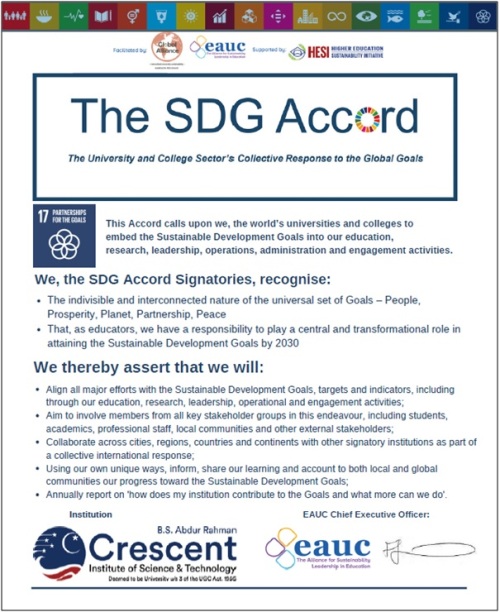
Figure XVII (2.2) – 13: SDG Accord Certificate
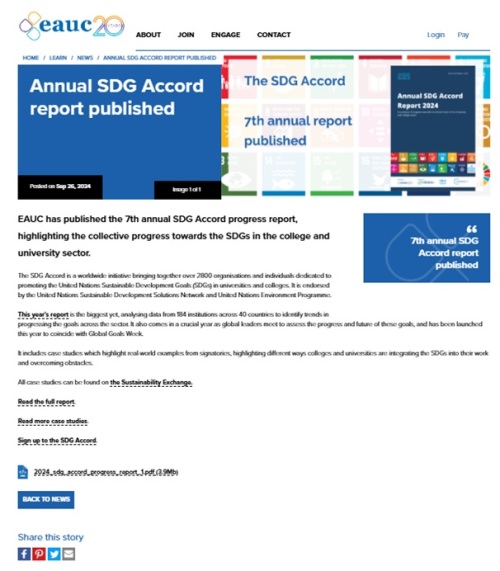
Figure XVII (2.2) – 14: Annual SDG Accord Report Published
SDG ACCORD REPORT 2024
Report Link : https://crescent.education/wp-content/uploads/2024/11/SDG-ACCORD-REPORT-2024.pdf
Website Link : https://www.eauc.org.uk/annual_sdg_accord_report_published1
Policy for Partnerships for the Goals
Issue: 04; Revised on 2023
| Policy Created on | July 2009 |
| 1st Revision amended on | IQAC Meeting held on 27th October 2017 |
| 2nd Revision amended on | IQAC Meeting held on 31st March 2021 |
| 3rd Revision amended on | IQAC Meeting held on 16th June 2023 |
17.1. OBJECTIVE
The primary objective of this policy is to establish and strengthen partnerships among universities, government bodies, NGOs, and the private sector to promote sustainable development through collaborative efforts, knowledge sharing, and resource mobilisation.
17.2 STATEMENT OF POLICY
The following metrics and indicators will guide the implementation of this policy.
- Research into Partnerships for the Goals: Increase the proportion of academic publications co-authored with low or lower-middle-income countries to foster global collaboration.
- Relationships to Support the Goals: Develop mechanisms to gather data on SDG progress and promote best practices through cross-sectoral dialogue.
- Publication of SDG Reports: Institutions must commit to publishing data on their performance against each of the 17 SDGs, ensuring transparency and accountability.
- Education for SDGs: Ensure a commitment to meaningful education around the SDGs across all university programs relevant to all students.
- Collaboration for SDG Best Practices: Engage in international collaboration to review and develop best practices for tackling the SDGs.
17.3 RESPONSIBILITIES
- Establish Collaborative Frameworks:
- Create Memoranda of Understanding (MoUs) with local and international organizations, NGOs, and government agencies to formalise partnerships.
- Engage in joint research initiatives that align with SDGs
- Enhance Sustainability Literacy:
- Integrate sustainability concepts into the curriculum across all disciplines, ensuring that students acquire the necessary knowledge, skills, and values to contribute to sustainable development.
- Implement workshops and training sessions for faculty and students to enhance understanding of the SDGs and their interconnections.
- Promote Cross-Sectoral Dialogue:
- Organize annual conferences and seminars that bring together stakeholders from academia, industry, and government to discuss progress, challenges, and innovative solutions related to the SDGs.
- Facilitate platforms for knowledge exchange, such as webinars and collaborative projects, to share best practices and successful case studies.
- Monitor and Evaluate Partnerships:
- Develop a robust monitoring and evaluation framework to assess the effectiveness of partnerships and their contributions to achieving the SDGs.
- Utilize data collected from partnerships to inform policy decisions and improve collaborative efforts.
17.4 IMPLEMENTATION
- Short-term (1-2 years): Establish partnerships, integrate sustainability literacy into the curriculum, and initiate cross-sectoral dialogues.
- Medium-term (3-5 years): Expand collaborative research projects, publish annual SDG reports, and evaluate the impact of partnerships.
- Long-term (5+ years): Foster a culture of sustainability within the institution and the community, ensuring ongoing commitment to the SDGs.
17.5 DISSEMINATION OF POLICY
. A. Signage and Visual Communication
- Campus Signage:
- Display clear and informative signage throughout the campus highlighting key aspects of the Partnerships for the Goals policy, focusing on sustainability practices.
- Utilize engaging visuals and infographics that effectively capture attention and communicate important messages.
B. Awareness Programs
- Regular Workshops and Seminars:
- Conduct awareness programs at regular intervals, including workshops, seminars, and training sessions to educate the campus community about the importance of partnerships for sustainability.
- Use interactive formats to promote engagement, encourage dialogue, and facilitate knowledge sharing among participants.
- Student and Faculty Involvement:
- Involve students and faculty in planning and executing awareness programs, fostering a sense of ownership and responsibility towards the policy’s implementation.
- Encourage student-led initiatives that promote collaboration and sustainability practices across campus.
C. Digital Communication
- Website Updates:
- Post the Partnerships for the Goals policy on the Institute’s official website, ensuring easy access for all stakeholders.
- Regularly update the webpage with new information regarding events, initiatives, and progress related to the policy.
- Social Media Engagement:
- Utilize social media platforms to raise awareness about the policy, share success stories, and promote upcoming events related to partnerships and sustainability.
- Create engaging content, including videos, infographics, and testimonials, to reach a broader audience and enhance visibility.
D . Key Performance Indicators (KPIs)
- Track the effectiveness of dissemination strategies through metrics.
17.6 ENFORCEMENT OF POLICY
a) The Dean of Schools and Head of the Departments monitor compliance and address breaches.
b) Awareness of the policy among students, staff, and visitors is essential.
c) Breaches may lead to disciplinary action per the Institute’s code of conduct.
REGISTRAR


